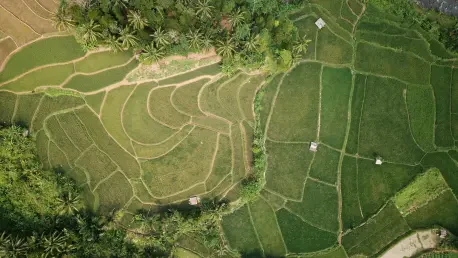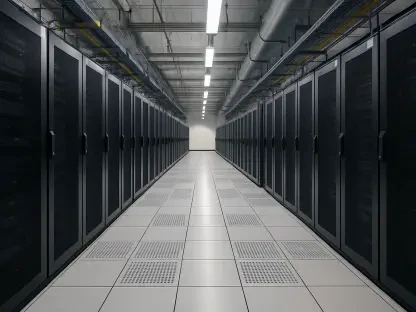The agricultural landscape has been evolving rapidly with technological advancements, aiming to improve productivity and sustainability in food production. One of the most notable developments is the integration of artificial intelligence (AI) and drones into rice farming, a major staple crop globally. The Texas A&M AgriLife Research and Extension Center has been at the forefront of this transformation. Led by Yubin Yang, Ph.D., a specialist in integrated cropping systems management, the center is leveraging digital technology to tackle challenges associated with rice cultivation. This initiative seeks to capitalize on AI and drone technology to enhance decision-making processes in agriculture, thereby maintaining the competitive edge of U.S. agriculture in a dynamic global landscape. By incorporating AI, the researchers aim to improve efficiency and reduce labor-intensive practices, providing a glimpse into the future of sustainable agriculture. With over two decades of dedicated research, the efforts at the Beaumont center signify a paradigm shift toward digital-driven agricultural practices.
Transformational Use of UAVs in Agriculture
A significant part of the digital transition in agriculture involves the utilization of unmanned aerial vehicles (UAVs), commonly referred to as drones. These devices have revolutionized data collection, offering a more efficient and comprehensive means to assess crop traits. Yang’s work at the Beaumont center emphasizes using UAVs to monitor and identify various pressures, including nutrient, water, and pest issues in rice crops. By employing this technology, researchers can gather detailed crop data that supports the development of precision agriculture techniques. UAVs enable the rapid assessment of large farming areas, providing high-resolution images that help in predicting crop yield and health accurately. These insights empower farmers to make informed decisions, ultimately leading to improved crop management and reduced environmental impact. The adoption of drones in agriculture not only enhances efficiency but also conserves resources such as water, which is critical in rice cultivation. As more agricultural stakeholders recognize the benefits of drone technology, its adoption is set to expand, marking a new era in crop management.
Digital decision-making tools, developed through UAV imagery and data analysis, are integral to this transformational process. These tools facilitate automated data collection, eliminating the need for manual fieldwork, which is often laborious and time-consuming. By identifying optimal rice genotypes, the center aims to streamline breeding programs and enhance the resilience of rice crops to various stress factors. The collaboration between Yang and other researchers, such as Omar Samonte, Ph.D., demonstrates a multidisciplinary approach to agricultural innovation. During events like the Beaumont Rice Field Day, new methodologies are showcased, illustrating the practical applications of UAV technology. This collaborative research approach underscores the potential of AI-driven tools in addressing complex agricultural challenges, ensuring the sustainability of rice farming practices. The integration of drones and AI portrays a promising future where digital solutions play a pivotal role in transforming traditional agricultural practices into a sophisticated and efficient system.
AI-Driven Solutions and Sustainable Rural Development
The shift towards AI-driven agricultural solutions is not just about enhancing productivity; it encompasses broader objectives such as sustainable rural development. By incorporating AI, researchers are addressing one of the critical issues in agriculture—sustainability. The digital tools being developed at the Beaumont center aid in minimizing the environmental footprint of rice farming. These efforts are crucial, especially as the agricultural sector faces mounting pressure to implement eco-friendly practices. Moreover, the implementation of AI technologies in farming can contribute to improved resource management, ensuring that inputs like fertilizers and pesticides are used judiciously. This careful management reduces waste and maximizes crop yields, aligning with global sustainability goals. Additionally, AI technology plays a vital role in mitigating the risks associated with climate change by providing predictive insights that help farmers adapt their practices accordingly. By fostering sustainable development, these technologies are poised to have a lasting impact on rural communities, promoting economic growth and stability in agricultural regions.
The drive for sustainability is matched by the emphasis on enhancing the competitiveness of U.S. agriculture on the global stage. By integrating digital tools into farming practices, agricultural stakeholders are positioning themselves to meet the demands of an ever-evolving global market. The advancements in rice farming serve as a model for other crop sectors, illustrating the potential benefits of adopting AI and drones across agriculture. The versatility of these technologies means they can be adapted to various crops and farming conditions, ensuring broad applicability and optimized results. As more farmers embrace these innovations, the agricultural landscape is expected to become more resilient and dynamic. The research and development spearheaded by leaders like Yang are pivotal in facilitating this transition, enabling farmers to harness cutting-edge technology for sustainable and efficient farming. The growing reliance on AI and drone technology marks a transformative chapter in agriculture, shaping a future where success is defined by innovation and sustainability.
Looking Ahead: The Future of Digital Farming
The agricultural sector is undergoing a rapid transformation thanks to technological advancements aimed at boosting productivity and sustainability in food production. A key development in this arena is the use of artificial intelligence (AI) and drones in rice farming, a crucial global staple. The Texas A&M AgriLife Research and Extension Center is spearheading this transformation under the guidance of Yubin Yang, Ph.D., an expert in integrated cropping systems management. The center utilizes digital technology to address challenges in rice cultivation. By integrating AI and drone technology, the initiative aims to improve decision-making in agriculture, ensuring U.S. agriculture remains competitive on the global stage. The incorporation of AI is intended to enhance efficiency and minimize labor-intensive tasks, offering a glimpse into the sustainable future of agriculture. With over 20 years of devoted research, the Beaumont center’s efforts represent a shift toward digitized agricultural practices, highlighting a new era in farming innovations and techniques.









